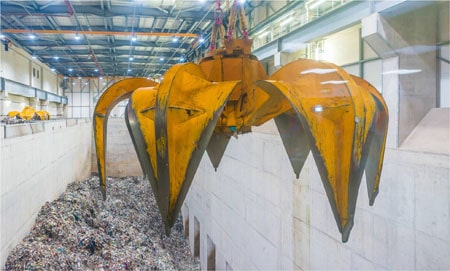The Environment Services Association (ESA) has called for a ‘supportive policy approach’ from government to encourage investment in EfW infrastructure, in a report published today (6 June).
In the report, ESA has highlighted the role that energy from waste (EfW) infrastructure plays in the circular economy, by providing an outlet for non-recyclable waste and a source of energy.

ESA has called for policy certainty over EfW
The comments come in the ESA’s report, ‘Energy for the Circular Economy: an overview of Energy from Waste in the UK,’ published this afternoon.
In the report, the Association claimed that incinerating waste items via EfW plants could power the “equivalent of all the homes in Birmingham” if its targets are met.
ESA has highlighted a series of policy proposals that could potentially “boost productivity” and support the diversion of waste from landfill, saving up to 12m tonnes of CO₂ per year.
Jacob Hayler, ESA’s executive director, said: “The government must support us in unlocking domestic infrastructure investment in EfW by creating a coherent, stable policy environment for recycling and resource management, focusing on the material that simply cannot be recycled, that recognises our sector’s positive role in delivering even greater benefits to the economy, whilst supporting and delivering the UK’s recycling ambitions.
“Our sector, in cost-effective partnerships with local authorities, is already successfully generating clean, low-carbon energy from non-recyclable waste at world-class facilities across the UK, and its contribution could be even greater.” He adds that an increased uptake with this method will help “keep costs down’ for local authorities.”
Achievements and targets
In 2016, ESA’s members, which represent 97% of the UK’s current EfW capacity, transferred 9.6Mt of waste from landfill to EfW; producing 5TWh of low-carbon electricity – enough to power 1.6m homes, as well as 730GWh of heat to district heating networks and industrial users, the Association says.
However, the EU Circular Economy Package has since introduced municipal recycling targets of 60% by 2030 rising to 65% by 2035.
ESA has stressed that more must be done by the industry in order to encourage the recycled material demand as it’s not “strong enough” to deliver these recycling rate targets on its own.
Recommendations
To achieve these objectives, the ESA has proposed three recommendations. The first measure is for government to develop an ‘ambitious and robust’ Resources & Waste Strategy and “establish a plan for high quality recycling.”

The organisation explained that the forthcoming Resources & Waste Strategy must not only set long-term ambition levels for “greater resource productivity”, but also implement a clear plan for waste reduction and recycling that will improve the quality of recycled material and stimulate demand.
The second recommendation addresses the “waste capacity gap and long term regulatory certainty” once waste reduction and recycling priorities have been set in the forthcoming Resources & Waste Strategy.
According to ESA, the government will have to assess how much extra residual waste treatment capacity is required and how best to facilitate its delivery by working closely with trade bodies. However, the ESA notes that the delivery should not be “undermined by sudden changes to taxes and subsidies” nor by policy and target alterations. “Any such changes should be signalled well in advance”, the association warned.
The final point calls for the better utilisation of heat offtake from EfW plants, through support for a heat pipe network and favourable planning conditions to encourage heat-use.
The ESA concluded: “The reality is urgent action from government is required via the Resources & Waste Strategy and the impending National Infrastructure Assessment on waste to deliver recycling targets and to ensure that the UK has the necessary domestic treatment infrastructure to handle post-recycling waste, as landfill capacity continues to rapidly diminish.
“ESA firmly believes government can help to unlock domestic infrastructure investment in EfW by creating a coherent, stable policy environment for recycling and resource management that recognises our sector’s positive role in delivering even greater benefits to the economy, whilst supporting and delivering the UK’s recycling ambitions. By addressing these three areas, we can seize the opportunity of making the most out of the UK’s resources.”
Related Links
ESA report
The post ESA calls for ‘policy certainty’ on EfW infrastructure appeared first on letsrecycle.com.
Source: letsrecycle.com Waste Managment


